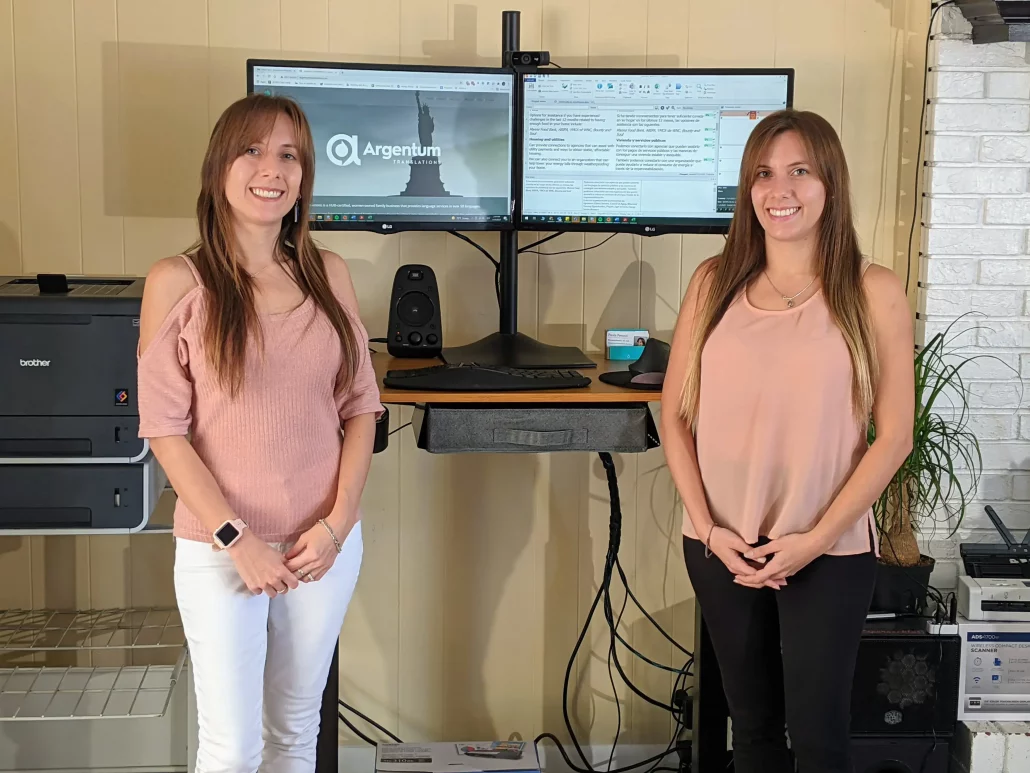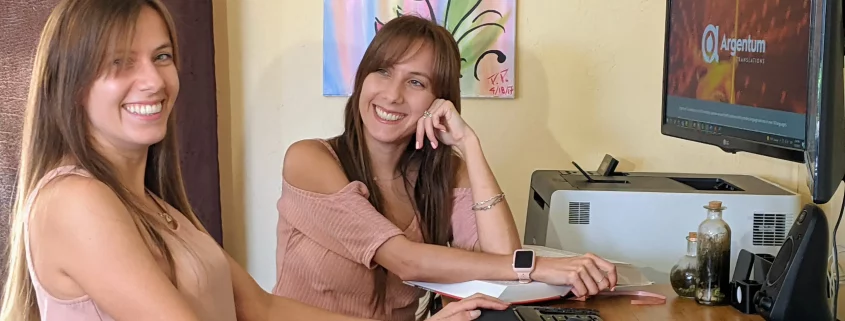Argentum Translations becomes a Certified Minority- and Women-Owned Business ( MWBE)
Enjoy this article written by Cayla Clark and published on the Mountain Xpress on October 13, 2021, to learn more about Cynthia and Paula Penovi’s entrepreneurial experience in Asheville as women and minority business owners, and their journey to get their translation agency, Argentum Translations, certified as a Minority- and Women-Owned Business (MWBE).
Asheville works to partner with women- and minority-owned businesses
As the saying goes, “Behind every great man, there’s a great woman.”
In the context of women-owned businesses, a more appropriate — albeit less catchy — slogan might be, “Behind every great woman, there’s a man with a professional network, capital and the income/assets necessary to get an entrepreneurial idea off the ground.”
According to Rosanna Mulcahy, business inclusion manager with the city of Asheville’s Community and Economic Development Department, women sometimes have a difficult time starting small businesses without the help of their partners. “My husband’s house helped me collateralize the loan I needed to start my own business,” she explains. “Had it just been me, I wouldn’t have qualified for that loan because I didn’t have any assets at the time.”
The city’s Minority or Woman Business Enterprise Certification, a process that officially went into effect on Jan. 1, is designed to help overcome those limits. By establishing a database of firms owned by women or people of color, Mulcahy explains, Asheville can offer those entrepreneurs more opportunities for work with the city than they might otherwise receive. And once certified by the city, local businesses can go on to receive similar certification at the North Carolina level, thereby qualifying for state contracts.
Mulcahy says the city’s approach is meant to avoid paperwork that can burden small MWBEs and get them supported more quickly. “Rather than ask for credentials and taxes, we ask, ‘Do you need help with your finances?’” she says. “We want to remove potential barriers.”
Closing the gap
The new efforts are in response to a study, conducted by the city in 2018, to identify disparities between the contract dollars Asheville spent with MWBEs and what it might have been expected to spend based on their availability for work. The research found that white women received disproportionately fewer contracts for professional services; Mulcahy notes that disparities for women of color weren’t examined. “It’s important to differentiate that women of color have it harder than white women because they often don’t have access to additional resources like these connections, capital and their husband’s income,” she says.
Since the MWBE certification process was adopted at the start of the year, Mulcahy says, 83 applications have been received as of Sept. 29, 80 of which have been approved. Many of those firms are lifestyle businesses, she adds, for which city government has little demand. “We need more trade businesses to register, such as electricians, plumbers, general contractors, concrete and asphalt businesses and arborists,” she says.
Mulcahy says it’s hard to say whether certification is driving an uptick in the city’s usage of MWBE contractors; she notes that quotas are illegal and Asheville has “aspirational goals” for their participation according to its Business Inclusion Policy. Because a disparity study is only conducted every five to seven years, more recent data is unavailable. And the city’s software systems, she adds, aren’t set up to identify spending on MWBE contracts.
“I have to personally sift through every single contract,” Mulcahy says. “Sometimes there are 30,000 transactions in one year. I’d have to go through every single transaction, and if a business is not registered as an MWBE, we are not capturing that data. That’s why it’s impossible to say how many contracts are going to women.”
Buncombe County’s government doesn’t yet track whether its vendors and contractors are owned by women or people of color, says county spokesperson Kassi Day. She notes that the county’s Finance Department is implementing contract management software that will allow vendors to register themselves online as MWBEs by the end of June.
“Business ownership is a vital part of creating generational wealth,” Day says. “In alignment with our Strategic and Racial Equity Action Plans, Buncombe County is committed to helping create and grow women- and minority-owned business enterprises.”
The county currently furthers that goal through its community partnerships, Day says. The Western Women’s Business Center, operated by the Carolina Small Business Development Fund, received a Strategic Partnership Grant this year for $29,500 to provide small-business training and technical assistance. And of 211 business loans and grants from the One Buncombe Fund pandemic relief program, 62% went to women-owned businesses, exceeding the county’s 50% goal.

The story so far
Local WMBEs report that Asheville’s certification process is both straightforward and beneficial.
Megan Naylor owns Mountain Goatscapes in Barnardsville, which uses goats to clear properties of invasive plants. She says she faced a few hurdles when she first launched her business in 2013. “There was definitely a steeper curve when it came to being accepted into the world of agriculture,” she explains. “As a woman in a male-dominated field, I had to prove myself in order to be respected.
“I’ve seen a huge shift from when I first started; women are now celebrated in the realm of outdoor work,” she continues. “That’s partially because the city is dedicated to bringing women to the forefront. We used to have to blaze our own trails; now, the city is supporting women who have been underserved in business leadership. The certification process helps level the playing field, highlighting education, talent and ability rather than sex — which is what’s really important.”
Sala Menaya-Merritt, owner of fashion business It’s Amira M, says the city has directly supported her work by providing market opportunities. “The city and the Business Inclusion Office have graciously paid for spaces at various markets in order for me and other minority-owned businesses to be able to sell their work,” she explains. “Imagine the load that’s taken off a small business if they don’t have to worry about paying for the fees to have a booth at a local market. That is huge, especially for those who are just starting out.”
Menaya-Merrit adds that the resources the city provides during MWBE certification have been particularly helpful. “I’ve worked directly with Rosanna, who has been very supportive. I applaud [the city] for the hard work they’re doing for small-business owners,” she says.
Naylor agrees. “The city isn’t just highlighting women in business, but actively helping them grow their businesses and providing them with educational resources,” she says. “Being certified as a woman-owned business has been a positive experience; it’s been a way to show how strong women in our community can be in regards to agriculture, business leadership and entrepreneurship.”
The willingness of Asheville to embrace and support small businesses makes the entrepreneurial experience all that much easier, according to Cynthia Penovi, who runs language services firm Argentum Translations, a minority- and women-owned family business, with her identical twin sister Paula Penovi.
“Local residents encourage and embrace the small-business community, which is an integral part of Asheville’s identity and economy,” she says. “When we moved here [from Buenos Aires, Argentina], we felt we were becoming part of a gender-conscious community that constantly challenges the barriers that support gender and minority inequality. Asheville’s go-local culture, love for entrepreneurship and social consciousness make it a favorable place for business inclusion.”
The original Mountain Xpress article can be found here: https://mountainx.com/




Leave a Reply
Want to join the discussion?Feel free to contribute!